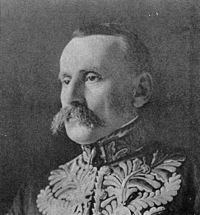Walter Egerton
|
Sir Walter Egerton KCMG |
|
|---|---|
 |
|
| Governor of British Guiana | |
|
In office 5 July 1912 – 15 April 1917 |
|
| Preceded by | Frederick Mitchell Hodgson |
| Succeeded by | Wilfred Collet |
| Governor of Southern Nigeria | |
|
In office August 1904 – 1912 |
|
| Preceded by | Ralph Moor |
| Succeeded by | Frederick Lugard |
| Governor of Lagos Colony | |
|
In office 1903 – 28 February 1906 |
|
| Preceded by | William MacGregor |
| Resident, Negeri Sembilan | |
|
In office 1902–1903 |
|
| Personal details | |
| Born | 1858 |
| Died | 1947 |
| Nationality | British |
Sir Walter Egerton KCMG (1858 – 22 March 1947) had a long career in the administration of the British Empire, holding senior positions which included the Governorships of Lagos Colony (1904–1906), Southern Nigeria (1906–1912), and British Guiana (1912–1917).
After an education at Tonbridge School, in 1880 Egerton went out from England to the Straits Settlements as a cadet and for several years served there and in the protected states of Malaya. In 1880, aged about 21, he was a Magistrate at Singapore; in 1883 he became Collector at Penang; he was next a Commissioner of the Court of Requests at Penang and was appointed Acting Resident there in 1894; In 1888, he was an acting First Magistrate at Penang, to which position he was later appointed. He acted as the Colonial Secretary for the Straits Settlements between 1899 and 1901.
Egerton was Resident in the protected state of Negeri Sembilan (1902–03). In this role, he got involved in the laws related to a form of servitude where a woman's illegitimate children were given into the custody of the local ruler. Egerton decided that this was contrary to Sharia law, and that the children belonged to their mothers. In this he was supported by the Sultan of Perak.
When Egerton became Governor of Lagos Colony in 1903 he already had more than twenty years of experience in the colonial service in the far east. Jalan Penghulu Cantik in Seremban was once named Egerton Road in his memory.
Egerton became Governor of Lagos Colony, covering most of the Yoruba lands in the southwest of what is now Nigeria, in 1903. The colonial office wanted to amalgamate the Lagos Colony with the protectorate of Southern Nigeria, and in August 1904 also appointed Egerton as High Commissioner for the Southern Nigeria Protectorate. He held both offices until 28 February 1906. On that date the two territories were formally united and Egerton was appointed Governor of the new Colony and Protectorate of Southern Nigeria, holding office until 1912. In the new Southern Nigeria, the old Lagos Colony became the Western Province, and the former Southern Nigerian Protectorate was split into a Central Province with capital at Warri and an Eastern Province with capital at Calabar.
...
Wikipedia
